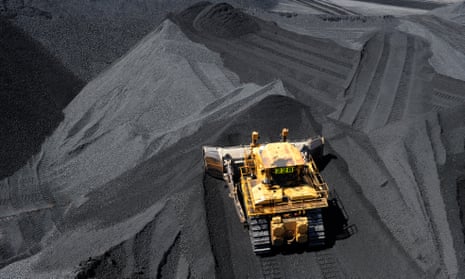Coal isn’t going anywhere, according to the boss of the World Coal Association (WCA), who said “sensible” investors should keep their money in the fossil fuel and avoid “political” moves to divest.
Coal is the most polluting fossil fuel and the industry has suffered heavily from the rapid rise of renewables in Europe and of shale gas in the US, with the threat of a greater crackdown on carbon emissions to come at a crunch UN climate change summit in Paris in December.
On Tuesday, the International Energy Agency said renewable energy is now the second-largest generator of electricity, attracting 60% of all investment, and is set to overtake coal in the early 2030s.
But Benjamin Sporton, the chief executive of the WCA, told the Guardian that the energy world’s centre has moved to Asia, where coal will be burned for many more decades as developing nations seek an “affordable, reliable and accessible fuel”.
“There is an assumption we can get rid of coal and that is how we can solve the climate problem,” Sporton said. “But coal plays a critical role in the world’s energy mix and is going to for a very long time to come. All sources of energy will increase, but coal isn’t going anywhere.”

Sporton said that coal will be increasingly used in Asia and that action to curb global warming therefore requires a drive to ensure older, dirtier power stations are replaced with modern, less polluting ones, followed by the widespread adoption of carbon capture and storage technology (CCS), which buries CO2 emissions. Sporton noted both China and India cited the cleaner use of coal as part of their climate action pledges submitted to the UN.
“The WCA has long recognised the need to reduce emissions,” he said. “The global objective is to reduce emissions to get us on the pathway to 2C [of global warming] and if we are going to achieve that [then] ‘high efficiency-low emissions’ and CCS technologies are needed.”
The WCA is not alone in expecting coal burning to continue. The International Energy Agency’s 2015 report predicts coal will provide 10% of the increased energy demand by 2040, largely due to a tripling in coal demand in India and in south-east Asia, though consumption in OECD nations is projected to drop by 40%.
Another recent report, published in the Proceedings of the National Academies of Science (PNAS), showed there is “a global renaissance of coal majorly driven by poor, fast-growing countries that increasingly rely on coal to satisfy their growing energy demand”.
Sporton said that renewables would play a role in bringing electricity to the 1.3 billion people who currently lack access, particularly in remote rural areas. But he said coal could provide much larger amounts of power: “Electricity for business and industry – that is where coal has a particularly important role to play.”
However, even the latest, most efficient coal technology still emits more CO2 than gas-powered power plants. The scientists who did the PNAS research concluded: “If future economic growth of poor countries is fuelled mainly by coal, ambitious [climate change] targets very likely will become unfeasible ... International climate policy must find ways to offer viable alternatives to coal for developing countries.”
Sporton said the development of carbon capture and storage (CCS), a technology which could slash CO2 emissions but is yet to be proven at commercial scale, was being held back by the lack of a level playing field with renewable energy. “We don’t see the same sort of policy support for CCS in most jurisdictions as we do for wind or solar,” he said, noting that the a £1bn CCS competition launched in 2007 by the UK government had “stuttered” and has yet to be awarded.
Asked why politicians were not backing CCS, Sporton said: “It’s probably a less attractive technology. It’s politically palatable to stand in front of a wind turbine and sell that whereas standing in front of a power station doesn’t look as interesting.”
Sporton dismissed the decision by Norway’s sovereign wealth fund, the world’s largest, to sell off its coal assets as having been taken for “presumably political reasons”. He said: “Coal is going to be an important part of the world’s energy mix for years to come, so any sensible, average investor should remain invested in coal.”
He also challenged analysis by the International Monetary Fund (IMF) that estimated subsidies to the global coal industry at $2.5tn a year, mainly made up of the damage caused by air pollution and climate change.
“When people look at the externalities, they are not conversely looking at the benefits. We need to look at both sides of the equation,” he said. “Coal provides affordable energy that helps economies grow and brings with that a whole pile of benefits that supports the developing and emerging economies in particular.”
However, climate economist Lord Nick Stern argues the IMF analysis “shatters the myth that fossil fuels are cheap by showing just how huge their real costs are.”
A recent study linked emissions from fossil fuel power stations to about 500,000 premature deaths a year. “Obviously [we] need to recognise the fact that we need to reduce emissions from coal, and not just carbon, but we are addressing this through modern coal technology,” said Sporton. The Economist argued in 2014 that such technologies were too costly: “None of these [emissions-cutting technologies] seems scalable in the way needed to dent the colossal damage done by coal.”
The World Bank, which has rejected the coal industry idea that its fuel provides a solution to poverty, has all but given up funding coal-fired power stations, as have other development banks.
“I think that is a mistake, because countries that don’t have the support to build the best technologies will build older, less efficient technology,” said Sporton, although he declined to specify a date by which heavily polluting coal power stations should be banned.

Comments (…)
Sign in or create your Guardian account to join the discussion